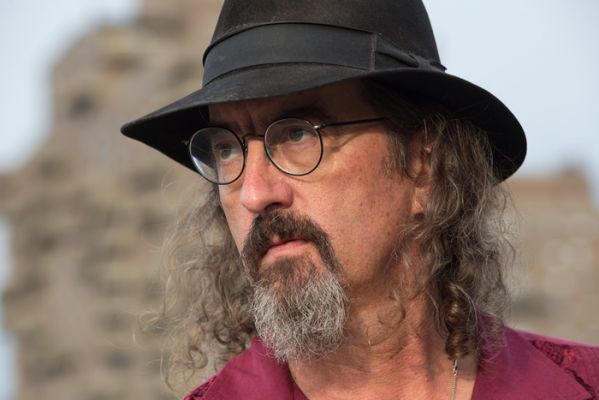Home > News
06/05/2015
James McMurtry brings his Complicated Game to the Aladdin on Sunday
by Scott Cunningham
Life may be complicated, but in his latest release James McMurtry does a mighty fine job capturing all of its little nuances.
That, of course, is nothing new for the storytelling McMurtry, who Stephen King considers one of the best songwriters of his generation. Not bad praise from a man who can spin a pretty good yarn himself.
McMutry visits the Aladdin Theater in Portland on Sunday and recently took time to chat with me about his new release, “Complicated Game.”
His first release in six years, the album is classic McMurtry. His eye for observation and detail is unmatched, and his character development is full of depth and nuance to an extent that it is easy to forget that it is mostly observational rather than autobiographical in nature.
Fans of his music might think his writing acumen is inherited. After all, his mother was an English professor and his father, Larry, is a Pulitzer Prize winning novelist.
After talking with McMurtry, I’m more inclined to attribute his writing to two other factors.
First, he has always considered himself an outsider. “We moved around a lot so I tended to be the new kid in class. When you do that, you can see things that the insiders don’t see any more.”
Perspective is everything when it comes to observation.
Second, he was deeply influenced at a young age by the master songwriters ahead of him, such as Kris Kristofferson and John Prine.
“Kristofferson was the first guy who identified to me as a songwriter. I was about nine years old when I first heard Me and Bobby McGee, and up until that point I had never put much thought into where songs came from.
“I saw Kristofferson play and he was having such a great time, I thought ‘That’s what I want to do.’”
Everyone has heard stories of songs being written in 20 minutes after waking from a dream in the middle of the night. McMurtry, though, takes a bit more leisurely approach to writing.
“Very few of my songs come together all at once,” he explains.” The only one I can think of is Ain’t Got a Place. That one just kind of fell out of the ceiling. Most of them are put together piecemeal over months or even years.”
He has always had the habit of jaunting down words or phrases that come to him. Early in his career, these would be written on pads of paper that he kept. Nowadays he uses a computer, but the process of building a song has remained the same.
“Sometimes I just scroll through the computer files. Once in a while, I’ll find a verse that has the same rhythm, rhyme and meter scheme as another verse I might have written and forgot about. Sometimes they go together and make a song.”
More typically, McMurtry begins with a bit of verse and a melody.
“But I have to think, ‘Who said that?’ And then I come up with a character that might have said that. Then I can come up with a character and get the story. If I’m lucky, it will fit into a verse / chorus structure where I can actually build a song out of it,” he explains.
McMurtry’s storytelling on “Complicated Game” is superb. South Dakota tells the story of a herd of cattle lost in an early season blizzard from the perspective of a young soldier returning home.
“My dad called up in fall of 2013 and asked if I had heard about the tragedy and I said which one. ‘The early blizzard in South Dakota, the one that killed all those cows.’
“It puzzled me for a minute, because he hates cows. He grew up ranching, so cows meant work to him. He hated them his whole life, but he does have an affinity for ranching people and that blizzard put a lot of people out of business.”
Not only does the chorus capture the desolate nature of ranching, it puts into verse the barren choices facing ranchers in the wake of the storm: “Because there ain’t much between the Pole and South Dakota / And barbed wire won’t stop the wind / You won’t get nothing here but broke and older / If I was you I might re-up again.”
In a similar vein, Carlisle’s Haul describes fishermen off the coast of Maryland trying to survive on the sea, forging a living with nets rather than fences and prairieland, an experience McMurtry witnessed first-hand.
“A friend of mine had a river house down by the mouth of the Potomac. We were down there duck hunting. It wasn’t fishing season, but we heard somebody was running a seine. We went down there to see what it was about,” he recalls.
Despite mostly empty nets, the fishermen sent McMurtry and his friends home with a nice bluefish, a gesture that reflected hope and gratitude in the face of their grim reality: “Because at the end of the rope / There’s a little more rope most times.”
While McMurtry may not consciously write autobiographical material, there are distinct parallels between his characters and his career, especially as it relates to some fundamental changes in the music industry.
“Nowadays, we make records so that you guys (music writers) will write about us so people will know we’re coming to town and fill up the clubs. Pretty much all of our income comes off the road now. Record sales aren’t what they were and half of them are downloads and the royalties on downloads are a lot lower than hard products, so we don’t have a lot of mailbox money to rely on.”
Musicians, just like the characters McMurtry writes about, have to make do as well.
ON TOUR
James McMurtry visits the Aladdin Theater on Sunday, June 7, 2015. Doors are at 7:00pm and tickets are still available as of this writing.








